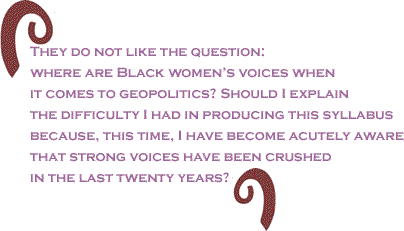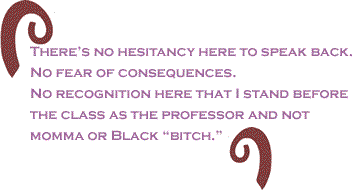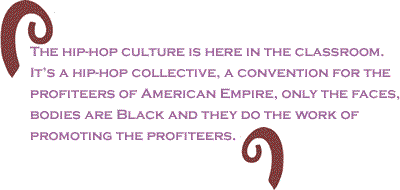
|
|||||||||||||||||||||||
 |

Custom Search
|
 |
Holy ghost woman stolen out of your name Rainbow Serpent whose faces have been forgotten Mother loosen my tongue or adorn me with a lighter burden Aido Hwedo is coming. “Call,” - Audre Lorde
They come dressed in the latest fashion: tight tops and tight jeans or short skirts. Sandals are deco-style and nails are polished. Every hair is in place, mostly salon done. It’s a college class of mostly Black women. They are young and sport their womanly awareness as a defense. But of what? I have never seen so many women for this class I have taught four times before in the last ten years. The Black men have been kept away. There are only three white students and no one is Latino/a or Asian. They do not like the question: where are Black women’s voices when it comes to geopolitics? Should I explain the difficulty I had in producing this syllabus because, this time, I have become acutely aware that strong voices have been crushed in the last twenty years? I am graying and wear dreads and attire made of African cloth. Heads come together to giggle and whisper. Sass is in, but now it’s done with a sense of entitlement rather than in defiance of white indifference. There’s no hesitancy here to speak back. No fear of consequences. No recognition here that I stand before the class as the professor and not momma or Black “bitch.” Make concessions because we are “STUDENTS!” And we students know that a Black woman, with her degrees and all, can be eliminated! But I know it’s not their voices I hear.
Here I am among a group of Black women, teaching a sophomore/junior level course on Black Women, and yet, I feel that for these women, I am the “enemy.” I am the enemy because I am “back in the day.” Some things have changed. And it’s not a matter of feeling old, but of being made to feel irrelevant, out-dated like the history I want to impart to them. Where are the “students”? The hip-hop culture is here in the classroom. It’s a hip-hop collective, a convention for the profiteers of American Empire, only the faces, bodies are Black and they do the work of promoting the profiteers. “Do I feel some Blacks have ‘sold out.’?” And it sounds like I am standing before a government mouthpiece from Fox News. Sold out? “People have to change. Change strategy and tactics.” It’s David Horowitz speaking behind the young Black face. She too is meticulously dressed and groomed. The young woman wants to know if I agreed. We are outside of class, and I am walking toward the office. I would rather not engage this voice. It’s not her voice. I see the young Black woman, but there’s a problem with the system. We can’t communicate. But change and become a billboard for corporate products? Change and ignore how the poor Black and working-class Black is lacking further and further behind because of economic policies and institutionalized practices that continue to marginalize and exclude them. Change and become complicit with consumerism and individualism? What of those struggles among the people of color that have never ended against poverty, and poor or lack of proper education? What of those struggles now for basic necessities like water? What of the unnecessary dying of Iraqis, Afghanistan women and children? Or the U.S. supported repressive regimes in Africa where lands remain “underdeveloped”? Relinquishing the right to stand among the oppressed is not an option; it’s not a matter of younger generation and older generation. It is not what they have taught you to think. I am not sure if she hears me. I walk along now and share a collective sigh with my ancestors. Will they care about Isis, Yaa Asantewa, or Sojourner Truth, or Bethune or Fannie Lou Hamer? Will the music of Odetta, Aretha Franklin, and Cassandra Wilson or the poetry of Sonia Sonchez and Wanda Coleman turn them off? When did I feel this sense of disappointment before? At predominantly white Midwestern institutions. Mostly white students had a sense of entitlement and felt put upon having to read Black women’s literature (all she talked about was Black women!), having to hear that racism, sexism, and classism are still alive and well (she’s racists! She hates men! She’s anti-American!).
They have come in our yards and truly stolen our children. When did the pods get placed near the bedsides of our young Black people? And I know they were stolen when Blacks surrendered and set out the white flags. Now the pods were delivered and I don’t recognize these people in my class. They have been absorbed and as a result regurgitate the nonsense of “transcending race.” They have been absorbed by the image of Rev. Jeremiah Wright represented as old, outdated veteran of the “Civil Rights Days.” They have become full members of the stream that runs around the world aggressively looking for a regime to change, looking for a country to invade, and looking for a world to conqueror once and for all. And do these students, Black students, sold on the idea that complicity is good, do they know what they have signed onto? On the first day of class, I asked them to consider the crisis facing Black women, and many of them took offense. A few of them began to whisper among themselves, looking askance at me. I had to stop class twice. At least two left the class while it was in session. These students have come to college for “jobs.” But do they know that the “jobs” might not be there? Do they want to know why? Do they know the ancestors are weeping? I hear the fearful whites and Black cohorts applauding as if they sense a victory in war. I move from disappointment to anger. So much depends on the inability of these students to think outside the cultural narrative. Their absorption has been smooth business, so smooth most do not even recognize that it is a narrative they have learned by heart—and not their narrative, the narrative of the “wretched” seeking liberation. It’s the tactic in the War on Terrorism waged by the American Empire against Black Americans. Democratic presidential candidate Barack Obama is the latest spokesperson for the tactic. He’s the ideal front man approved by the beneficiaries (multinational corporations) of American Empire.
But the damage was done long before Obama thought to start on the road to the hite House. The problem is bigger than any one man. The people must be taught to cry ‘Stop thief!’ But I must recover my spirit first… Holy ghost woman stolen out of your name Rainbow Serpent whose faces have been forgotten Mother loosen my tongue or adorn me with a lighter burden Aido Hwedo* is coming. On worn kitchen stools and tables we are piercing our weapons together scraps of different histories do not let us shatter any altar she who scrubs the capitol toilets, listening is out sister’s youngest daughter gnarled Harriet’s anointed you have not been without honor even the young guerilla has chosen yells as she fires into the thicket Aido Hwedo is coming. I have written your names on my cheekbones Dreamed your eyes flesh my epiphany Most ancient goddesses hear me enter I have not forgotten your worship nor my sisters nor the sons of my daughters my children watch your print in their labors and they say Aido Hwedo is coming. I am a Black woman turning mouthing your name as a password through seductions self-slaughter and I believe in the holy ghost mother in your flames beyond our vision blown light through fingers of women enduring warring sometimes outside your name we do not choose all our rituals Thandi Modise winged girl of Soweto brought fire back home in the snout of a mortar and passes the word from her prison cell whispering Aido Hwedo is coming. …
We are learning by heart what has never been taught you are my given fire-tongued Oya Seboulisa Mawu Afrekete and now we are mourning our sisters lost to the false hush of sorrow to hardness and hatchets and childbirth and we are shouting Rosa Parks and Fannie Lou Hamer Assata Shakur and Yaa Asantewa my mother and Winnie Mandela are signing in my throat the holy ghosts’ linguist one iron silence broken Aido Hwedo is calling calling your daughters are named and conceiving Mother loosen my tongue or adorn me with a lighter burden Aido Hwedo is coming. Aido Hwedo is coming. Aido Hwedo is coming. Do I throw up my hands and give up? There are days I wish to do just that. I imagine days upon days of rising in the morning, looking at the clock, and saying: I am not there. I am not there. No more classrooms and faces perturbed. No more witnessing the procession of bodies dragging a cell phone in one hand and an Ipod in another, reluctant to disconnect themselves from the gadgets that envelop them in that “false hush of sorrow.” I imagine enduring no more sighs as I witness the repetition of this sorrowful scene. We have learned by heart what has never been taught. I would like for the burden to be passed to someone else. I would like to think that I could pass them on the streets or sit next to them on the bus and not care, not worry that the silencing of our history will ultimately kill them. I would like to think that it really does not matter. But I witness too much sorrow, too much injustice, too many conspiracies to kill us Black, Brown, Red, and Yellow people. Platitudes will not do. Political activism takes all shapes. I believe in the holy ghost women, the women with stolen names - the ancestors of all ancestors. I would like to imagine the holy ghost women taking hold of what has been stolen in that classroom and surround us as we call forth Aido Hwedo to help us form a community. This is what I imagine even while I am troubled by what I see. *Aido Hwedo, Rainbow Serpent, “is also a representation of all ancient divinities who must be worshipped but whose names and faces have been lost in time.” *Aido Hwedo, Rainbow Serpent, “is also a representation of all ancient divinities who must be worshipped but whose names and faces have been lost in time.” BlackCommentator.com
Editorial Board member, Lenore Jean Daniels, PhD, has been
a writer, for over thirty years of commentary, resistance criticism
and cultural theory, and short stories with a Marxist sensibility
to the impact of cultural narrative violence and its antithesis,
resistance narratives. With entrenched dedication to justice and
equality, she has served as a coordinator of student and community
resistance projects that encourage the Black Feminist idea of
an equalitarian community and facilitator of student-teacher communities
behind the walls of academia for the last twenty years. Dr. Daniels
holds a PhD in Modern American Literatures, with a specialty in
Cultural Theory (race, gender, class narratives) from |
Any BlackCommentator.com article may be re-printed so long as it is re-printed in its entirety and full credit given to the author and www.BlackCommentator.com. If the re-print is on the Internet we additionally request a link back to the original piece on our Website. Your comments are always welcome. eMail re-print notice
If you send us an eMail message we may publish all or part of it, unless you tell us it is not for publication. You may also request that we withhold your name. Thank you very much for your readership. |
| |
| September 11, 2008 Issue 290 |
|
| Executive Editor: Bill Fletcher, Jr. |
| Managing Editor: Nancy Littlefield |
| Publisher: Peter Gamble |
| Est. April 5, 2002 |
Printer Friendly Version
in resizeable plain
text format or pdf
format. |
| Frequently Asked Questions |
 |

|
 |
 |
 |
| |
| |







































